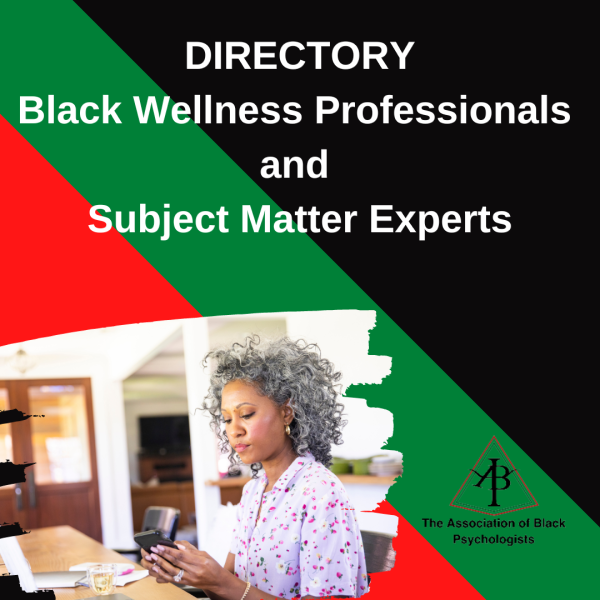By: Drs. Kathy Burlew and Suzanne Cunningham-Randolph
The pandemic has adversely impacted the mental health of adults, couples, children, and families of Afrikan ancestry living in the United States in multiple ways. Most significant is the exposure of structural and systemic racism, which is manifested in health, mental health, social, and economic disparities.
It is impossible to separate the impact of these social determinants and racial injustices from the impact of the COVID-19 pandemic.
Importantly, although Blacks live in communities that face a huge task in recovering from the pandemic and in circumstances that exacerbate these impacts, fortunately, the needs assessment identified many assets that can be mobilized to confront these challenges.
Interdisciplinary and inter-agency collaborations and partnership efforts are needed to leverage public and private resources that can address COVID-19’s impacts and advance equity factors related to: structural and individual racism, children’s mental health, family and couple relationships, and adult well-being, inadequate funding for community-based organizations and informal networks to provide needed services, and the engagement of inter-professional organizations in culturally-responsive mental health training and service delivery.
Importantly, these peeks into the windows of mental health impacts in Black communities and the insights from the other groups that were part of the larger needs assessment can provide insights for transforming our mental health practices to advance equity in mental health. The report encouraged decision-makers to engage ABPsi, community stakeholders, and constituents in genuine partnerships to accomplish this lofty aim.
Although the participating organizations had similar goals and collaborated on a common set of items, the final survey of each organization also addressed that organization’s unique concerns. The objective of the ABPsi’s COVID-19 Needs Assessment Project was to assess the extent to which the COVID-19 pandemic has affected Black/Africana adults (ages 18 and older) who live in the United States of America (USA), especially as related to the impact on their mental health and the delivery of mental health services in Black communities.
Research Study Design
The design was a cross-sectional, mixed-methods, community systems analysis. The ABPsi study included three components:
- Qualtrics survey of 2480 Black adults.
- A community sample of 632 participants (ABPsi partnered with community organizations to gather this sample).
- 31 qualitative interviews with community stakeholders.
The sample included large metropolitan areas, midsize metropolitan areas, and rural areas. Specifically, the primary sites were: Los Angeles, Detroit, DC/Maryland, Mississippi Delta, New Orleans, and Houston.
As expected, anxiety (38%) and depressive (39%) symptoms were quite high in the sample. However, the study also includes findings on primary worries and stressors, essential worker status, access to protective equipment at work, COVID impact on family dynamics, everyday discrimination, the intersection of COVID-19 and racial injustice, the relation of race-related stressors and cultural mistrust to mental health outcomes and vaccine hesitancy and much more.
Overall Conclusions
The pandemic has adversely impacted the mental health of adults, couples, children, and families of Afrikan ancestry living in the United States in multiple ways. Most significant is the exposure of structural and systemic racism, which is manifested in health, mental health, social, and economic disparities.
It is not possible to separate the impact of these social determinants and racial injustices from the impact of the COVID-19 pandemic.
Importantly, although Blacks live in communities that face a huge task in recovering from the pandemic and in circumstances that exacerbate these impacts, fortunately, the needs assessment identified many assets that can be mobilized to confront these challenges.
Interdisciplinary and inter-agency collaborations and partnership efforts are needed to leverage public and private resources that can address COVID-19’s impacts and advance equity factors related to:
structural and individual racism, children’s mental health, family and couple relationships, and adult well-being, inadequate funding for community-based organizations and informal networks to provide needed services, and the engagement of inter-professional organizations in culturally-responsive mental health training and service delivery.
Importantly, these peeks into the windows of mental health impacts in Black communities and the insights from the other groups that were part of the larger needs assessment can provide insights for transforming our mental health practices to advance equity in mental health. The report encouraged decision-makers to engage ABPsi, community stakeholders, and constituents in genuine partnerships to accomplish this lofty aim.
Review the full report at www.abpsi.org
Research Team
The senior researcher on the ABPsi team was past ABPsi president, Dr. Suzanne Randolph-Cunningham. The other professional members of the team were, A. Kathleen Burlew, Huberta Jackson-Lowman, Amber Golden, Kevin Cokley, Tracie Lowe, Lauren Ramsey, Olivia Barnes, Gloria Shivers, Rachel D. Gaiter, and V. Fay Mays-Bester. Additionally, three ABPsi students were also on the team including, Marlie A. Harris, Stephanie Castelin, and Zoe Davis.
To date, the team has presented the findings to multiple national, university, philanthropic sponsors, and government organizations. The team also published two articles in the Journal of Community Psychology special issue.
Grills, C., Carlos Chavez, F. L., Saw, A., Walters, K. L., Burlew, K., Randolph Cunningham, S. M., Rosario, C. C., Samoa, R., & Jackson-Lowman, H. (2022). Applying culturalist methodologies to discern COVID-19’s impact on communities of color. Journal of Community Psychology, 1– 24.
Cokley, K., Krueger, N., Randolph Cunningham, S., Burlew, A.K., Hall, S., Harris, K., Castelin, S., Coleman, C. (2021). The COVID-19/racial injustice syndemic and mental health among Black Americans: The roles of general and race-related COVID worry, cultural mistrust, and perceived discrimination. Journal of Community Psychology.
We are pleased to report that students have been involved in all phases of the needs assessment, including the research, the presentations, and the publications. Two students presented posters at the convention last year, and two students are first authors on upcoming publications.



